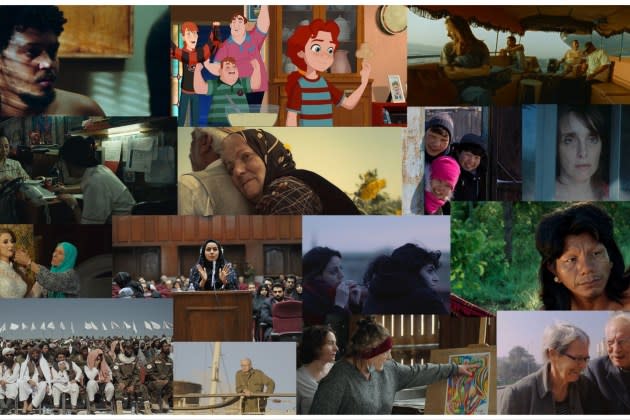Main Takeaways From El Gouna Film Festival: ‘I See It as a Hub for Arab Filmmakers’

The 6th edition of the El Gouna Film Festival (GFF) has wrapped with a feeling of quiet triumph. The glitz and celebrities were largely absent, although Egyptian star Yousra and legendary French actor Christophe Lambert both appeared at In Conversation events. But in a way, this allowed festival organizers to better focus on the core values which they wish to take forward.
For artistic director Marianne Khoury, the mission was clear, though the challenges were extraordinary, even before the horrific attacks on Israel on Oct. 7. “I joined in June, so it was quite a crazy summer where we’re working almost every day. Then on the 10th October, we decided to postpone. So it was very overwhelming. Since then, we were on hold every day. We wanted this edition to take place before the year end.”
Better late than never; better small than not at all
With the 2022 edition already having been canceled, another cancelation would’ve been catastrophic, co-founder and executive director, Amr Mansi, told Variety. “When we were four days away from the festival, we were planning a huge international edition. Accreditation more than doubled one week before the festival. Lots of confirmations from producers, agents, a lot of international guests, filmmakers, celebrities, industry. We were planning a big hit for our comeback,” Mansi says.
More from Variety
Iraqi and Palestinian Projects Take Top Prizes in CineGouna Springboard Awards
'Fallen Leaves,' 'Io Capitano,' 'Lost Country' Compete for Arab Critics' Awards for European Films
“For me as well, I co-founded this festival and was the CEO for the first three years. This was my comeback, so the decision to postpone the festival was hard, not knowing whether we’re able to do it, just mentally, was very, very heavy on me and the team. First of all, I will take this opportunity to thank Samih Sawiris, who was the one who took this risk and decided we were going to do it in order to deliver a message of seriousness and commitment to the industry.”
Despite the loss of guests and an almost 50% drop in accreditations following the postponement, the delay allowed the festival to focus even more clearly on the innovation of the CineGouna Platform (CGP). “This was very important for me,” Mansi says. “This was the vision that we had and I believe this is what everybody’s talking about. So if we were able to pull it off at such short notice, under these circumstances, I’m assured of the future for this festival.”
Palestinian filmmakers were not forgotten
The current war in Gaza hung like a dark shadow throughout the festival. During a panel on Arab representation in the West, jury member and actor Manal Issa (“The Swimmer”) gave a bleak prophecy: “There’s going to be a cinematic war” as Arab characters are dehumanized and vilified.
In acknowledgement of the plight of Palestinian civilians, a “Window on Palestine” program was compiled including films like 2016’s “Ambulance,” directed by Mohamed Jabaly, and Farah Nabulsi’s “The Teacher,” which premiered this year, as well as a discussion “Camera in Crisis: A Lens on Palestine.” Variety spoke with one of the participants of the panel, Khalil Al Mozian, the filmmaker and organizer of the Red Carpet Human Rights Film Festival in Gaza. “As a filmmaker and as the director of the festival I have to make Palestinians visible to the world. I am not against Israel; I’m against occupation. If Palestine is not saved, then Israel is not saved. There’s no military solution.” Unbelievably, Mozian has on his phone a PDF of the plan for the 8th edition of his festival to be held in 2024. “But we have to wait for the end of the war,” he says.
The international presence
Despite the smaller version of the festival, the program offered still had a strong international flavor including festival hits like Palme d’Or winner Justine Triet’s “Anatomy of a Fall” and Molly Manning Walker’s “How to Have Sex,” as well as intriguing films such as Brazilian Guto Parente’s “A Strange Path,” about a filmmaker returning home to visit his father, and Lubdhak Chatterjee’s “Whispers of Fire and Water,” a haunting tale of a sound artist exploring the coal fields of Jharia, India.
Khoury is adamant that local audiences should also be attracted to the festival: “I made the bet that I will get 2,000 people from Gouna, and today we had a school at one of the screenings of ‘Scrapper,’ and we give them the experience with someone to present the film and then have a small discussion with the kids.”
A new industry hub?
“I feel that the cinema industry is falling apart and that a festival, like El Gouna, can play a very important role in reviving things and playing a role in the industry; participating in production, distribution, creating networking opportunities,” Khoury tells Variety. “Personally, I feel this is the main role of the festival.” To this end, the CineGouna Platform has been relaunched, with an improved hub bringing together panels, pitching venues, training schemes, mentorships, masterclasses and initiatives such as the CineGouna Springboard and Bridge, connecting filmmakers with sources of funding.
Mansi agrees: “I see it as a hub for Arab filmmakers, supporting Arab filmmakers, and putting the festival on an international standing. I see it growing. The venue is amazing. It’s already a 50% bonus once people arrive here. They’re already in a good mood, ready to network; willing to invest; willing to talk. You create the circumstances, this energy, and it makes it easier for everyone.”
Best of Variety
Sign up for Variety’s Newsletter. For the latest news, follow us on Facebook, Twitter, and Instagram.